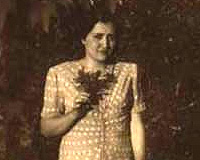What comes next is part of the composed text of four interview sessions with the last wife of Reza Shah which took place in 1994 and 1995 – the first interview took place on June 3rd 1994 and the next interviews on November 12th, November 23rd 1994 and May 21st 1995 a few months ...
What comes next is part of the composed text of four interview sessions with the last wife of Reza Shah which took place in 1994 and 1995 – the first interview took place on June 3rd 1994 and the next interviews on November 12th, November 23rd 1994 and May 21st 1995 a few months before her death in her house.
□Thank you for taking part in this interview Mrs. Dolatshahi, please talk about you’re the things you remember of your family background.
I was born in 1905. My grandfather, known as Meshakat-al-Doleh was from the Qajar dynasty and he had courtier positions in the Qajar period. My father, GholamaliMirzaMojalal-al-Doleh was the chief of the court’s etiquette at the time of Reza Shah and so there was a special closeness between him and the king.
An uncle of mine Mohammad Ali Dolatshahi (Meshkat-al-Doleh1) was the minister of post and telegraph. One day when the office worker brings his tea, finds him dead behind the desk. My other uncle was AbulfathDolatshahi. All three brothers died of heart disease.
My mother was GoharMolk. She died a while after giving birth to her last child due to negligence of doctors and lack of medical equipment in Malayer. She was young and was buried in Qom. Her brother Hesam-al-Saltaneh was Naser-al-Din Shah’s agent and a top level classical music master in Iran. He knew all the Iranian instruments and was especially good in playing the violin. For a time he taught the crown prince, Mohammad Hassan Mirza. He had a son named Fereidoon who now lived in Belguim. Hesam-al-Saltaneh’s mother was Ebtehaj-al-Saltaneh and she had good handwriting.
I had two brothers and two sisters. My older sister, Ashraf-a-Saltaneh, wife of Colonel Pasha Khan Mobasher, accompanied me on my trip to Morris. My other sister, Ezzat, was younger than me and loved to marry her cousin. My two brothers, Ahmad Mirza and Abbas Mirza were sent abroad to study by Reza Shah. One studied in England’s University of Westminster and the other in France’s Saint Cyr. When they returned to Iran, they were not happy and died due to opium and alcohol addiction. One day when I visited Ahmad Mirza he whined and said: “look at me!” Abbas Mirza also put opium in alcohol and drank it, his liver was damaged and he was hospitalized in Shahrbani hospital for a while. Both killed themselves intentionally although they were educated.
□How did you meet Reza Shah and why did he choose you for marriage?
I was 13 or 14 and I had many proposals for marriage and one of them was Sardar Sepah. His proposal came through Karim Aqa Buzarjomhoori and Sardar Sepah’s nephew and brother-in-law. My father also like me to marry Sardar Sepah due to their close relations.
Once he sent me a message through one of the elders that: you have many suitors but Sardar Sepah is more powerful than all and it is better if you marry him. At that time my father was appointed as the governor of Malayer. We went to Malayer and there my mother passed away. When we returned to Tehran I said: “we are in mourning and I can’t get married now.” But some of the close relatives like my aunt (Meshkat-al-Doleh’s wife) and others insisted that I accept. I was in a situation that marriage scared me. I hadn’t even seen a photo of Sardar Sepah and I didn’t knowif he has seen me or not. But because my father praised Reza Khan very much and believed he is gifted and a good man I couldn’t say anything and did as he told me…
□How did Taj-ol-Molook (Reza Khan’s other wife)2 react to this marriage?
As a matter of fact at the night of the wedding she was standing by the door and because she was very troubled by the matter she couldn’t stop cursing and screaming. She didn’t want a co-wife. She had also brought some people with her to ruin the wedding ceremony but Sardar Sepah found out and ordered some soldiers to take her home…
□As you are aware, unveiling of the women occurred when you were the king’s wife, what memories do you have of this incident?
At that time all classes believed in certain ethics. The women did not go out much. It wasn’t the matter of veil; most women wore a kind of old-fashioned veil with a kind of mask which covered the whole face. In such a situation there came the order of unveiling women with force and so the people reacted severely. I remember we felt ashamed even when we rode in cars and saw other people. This was not limited to a certain class and all people suffered from this unwise order. Reza Shah had ordered everyone not to wear hijab. This was difficult at first and we were ashamed and uncomfortable. At first we used wigs and wore long costs with high collars. We tried to go out less and so we mostly went out of town. I remember on those days I used to go to Hesam-al-Saltaneh’s garden in Akbarabad to be away from the crowd. We didn’t have a choice and had to obey the order.
https://iichs.ir/vdcb.zb8urhbzfe4pr.html
iichs.ir/vdcb.zb8urhbzfe4pr.html
